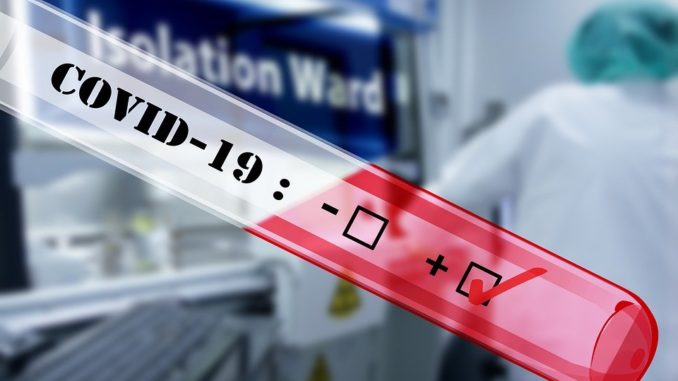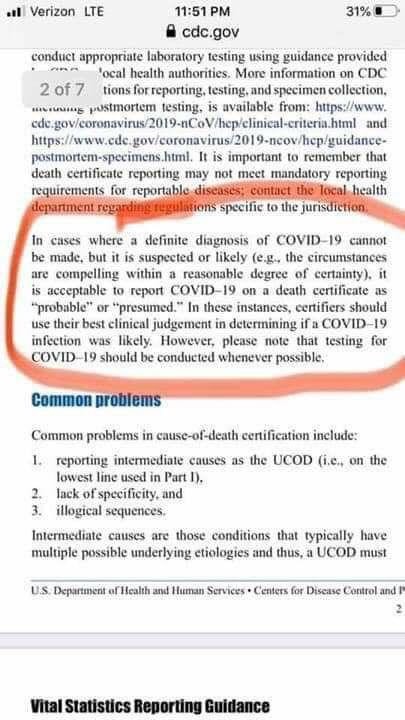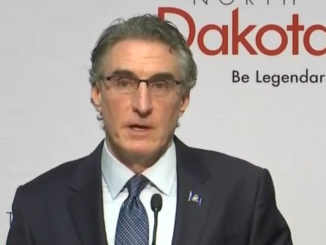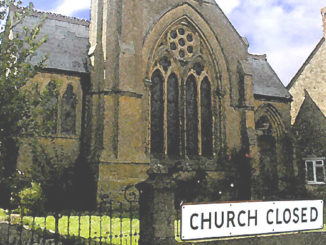
Yesterday, a reader of The Minuteman sent me a startling piece of information she had obtained. It was a screenshot — followed by a direct link — of a document from the U.S. Department of Health and Human Services.
This seven page document — dated April 2020 — is titled “Guidance for Certifying Deaths Due to Coronavirus Disease 2019 (COVID–19)” and provides instruction on filling out death certificates.
To provide some context as to why death certificates are important, the Introduction to this document states that:
“In public health emergencies, mortality surveillance provides crucial information about population-level disease progression, as well as guides the development of public health interventions and assessment of their impact. Monitoring and analysis of mortality data allow dissemination of critical information to the public and key stakeholders. One of the most important methods of mortality surveillance is through monitoring causes of death as reported on death certificates.” (Emphasis Added)
Fair enough.
But then on page 2, under the heading “Certifying deaths due to COVID–19”, we find this:
“In cases where a definite diagnosis of COVID–19 cannot be made, but it is suspected or likely (e.g., the circumstances are compelling within a reasonable degree of certainty), it is acceptable to report COVID–19 on a death certificate as “probable” or “presumed.” In these instances, certifiers should use their best clinical judgement in determining if a COVID–19 infection was likely. However, please note that testing for COVID–19 should be conducted whenever possible.” (Emphasis Added)

In short, the U.S. Department of Health is saying that testing isn’t required in order to list COVID-19 as an underlying cause of death.
The document then ends with this Conclusion:
“An accurate count of the number of deaths due to COVID–19 infection, which depends in part on proper death certification, is critical to ongoing public health surveillance and response. When a death is due to COVID–19, it is likely the UCOD and thus, it should be reported on the lowest line used in Part I of the death certificate. Ideally, testing for COVID–19 should be conducted, but it is acceptable to report COVID–19 on a death certificate without this confirmation if the circumstances are compelling within a reasonable degree of certainty.” (Emphasis Added)
Isn’t this a bit contradictory? How can an “accurate count of the number of deaths due to COVID-19 infection” be possible if those authorized to fill out death certificates list the virus as an underlying cause of death without a test to confirm it? To the contrary, won’t this lead to a skewing of the numbers instead?
After receiving this information, I later discovered that this issue had inadvertently come up when Point of View’s Chris Berg interviewed Minnesota State Senator Scott Jensen yesterday. You can watch that below:
As you can see, not only is Jensen a State Senator, but he’s also a physician. He too received the aforementioned seven page document and found it highly questionable.
By virtue of the fact that death certificates aid in the “development of public health interventions”, I strongly believe there’s an obligation, on the part of those filling them out, to be accurate. Yet, the terms “probable” and “presumed” fall short of that standard.
I don’t pretend to know how accurate the reported number of deaths have been thus far in the United States. But this document certainly causes some questions going forward. And that’s unfortunate.
As of this writing, there have been more than 422,000 cases of COVID-19 reported in the United States. The death toll now sits at well over 14,000.
Schools, churches, businesses, etc. have closed. Grocery store shelves are void of items like toilet paper, Clorox wipes, and a variety of food. Social distancing, self-quarantines, and stay-at-home orders have all become the norm in much of the country. Unemployment is skyrocketing. Savings — if they existed — are being depleted. The economy is in trouble. Every one of us has — in some way — been affected by this “pandemic”.
Under these circumstances, so much is done in the name of “public health”. To some degree, it is — at the very least — understandable. But is it too much to ask that something as simple as filling out a death certificate be done with a high degree of accuracy? Especially when such a thing is used in the “ongoing public health surveillance and response” to COVID-19? I don’t think that it is.
Right or wrong, chalk it up to one more example of why people are so skeptical of their government.
PLEASE LIKE & SHARE
Sources:
1. https://www.cdc.gov/nchs/data/nvss/vsrg/vsrg03-508.pdf?fbclid=IwAR0BHsHMPdIJyjL1Uz8LoM6H9jj_Y_jclHFHeVCUGAEYXy6aSBYNRgiDAoc
2. https://www.senate.mn/members/member_bio_print.php?mem_id=1233
3. https://www.facebook.com/POVnow/videos/251341969243888/UzpfSTU2MjY0Mzg0MDU2Njk5ODoxNjEwMjMxODY1ODA4MTg1/
4. https://www.worldometers.info/coronavirus/





